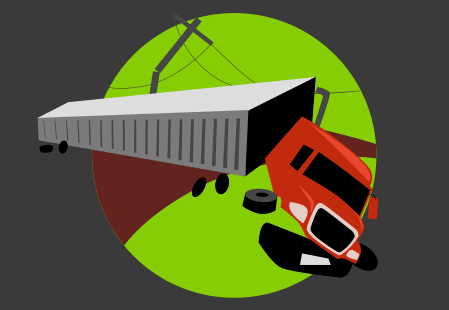Big truck crashes are not only among the most frequently deadly wrecks, they are also some of the hardest injury and wrongful death claims for victims to win. This is especially true in Alabama, where if insurance companies can pin even 1% of blame on victims—for example, if the victims were driving over the speed limit before their crash—those victims may be denied any compensation when they have hundreds of thousands of dollars in medical debt and other losses after their crashes.
That is why it’s important to establish liability early on in jack-knife crashes.
What is a Jack-Knife Accident?
A semi-truck’s cab and trailer are separate, distinct parts. A “jack-knife” crash is when the trailer swings out at an angle away from the cab rather than being pulled directly behind it.
If you picture a pocketknife folding into its handle, you’ll know what a jack-knifed semi-truck looks like.
Related Reading: Who is Liable When a Semi-Truck is Making a Wide Turn?
How Do Jack-Knife Accidents Happen?
Jack-knife crashes are one of the most common types of big truck accidents, because they can be caused a number of ways.
- Driver inexperience: When trucking companies hire drivers who lack the skill or experience to handle a semi-truck, and/or don’t properly train their drivers, these types of crashes are more likely to happen.
- Driving too fast: If a truck driver is going too fast, the weight of the trailer means it will slow down slower than the cab does when the driver hits the brakes, and the trailer may then keep going and swing out even after the cab has slowed or stopped.
- Slippery roads: If the truck loses traction at any point, because of wet roads or any other poor road conditions, it makes it much easier for the trailer to swing out.
- Improperly loaded cargo: When cargo is not loaded correctly—i.e., the weight is not properly distributed or the cargo isn’t properly secured so it slides around inside the trailer—it makes it much harder for the truck driver to control the truck, and the risk of a jack-knife crash or even a rollover crash goes way up.
- Poor truck maintenance: Trucking companies are required to take good care of their vehicles. While the average passenger car might be driven around 10,000-15,000 miles in a year, the average semi-truck is driven more like 50,000-100,000 miles per year! That means tires, brakes, and other parts must be replaced regularly to prevent malfunction or breakdown. When they aren’t, a truck can easily jack-knife.
- Dangerously designed roads: Semi-trucks’ length and weight mean they can be hard to maneuver on anything but level straightaways. Sharply curved or steeped grade roads can cause truck drivers to lose control of their trucks.
Who is Liable?
What makes big truck injury claims so difficult is that there are often multiple people or parties who could be liable, depending on how the wreck happened.
For example, the truck driver may be at fault for driving negligently, but the trucking company the driver works for could also be at fault for failing to train the driver how to handle the truck.
If the truck’s brakes failed, the trucking company may be at fault for not getting them replaced when they should have, or the company that provides the truck maintenance may be at fault for cutting corners. The government body that maintains the roads may even be at fault for not placing road signs warning trucks to reduce speed before entering a curve or slope.
Trucking companies and their insurance providers will fight hard to find any excuse to shed blame, which means you need an experienced truck accident lawyer to ensure that the people at fault are discovered and made to take responsibility.
What Kind of Injuries are Common in Jack-Knife Accidents?
Jack-knife crashes, like any type of wreck involving a big truck, can cause serious injuries, often to the people not in the truck.
The trailer of the truck can collide with other vehicles when it swings out, and a fully loaded semi-truck can weigh up to 80,000 lbs. With that much force behind it, the trailer can do devastating damage to the vehicles, and vehicle occupants, around it.
A semi-truck that has jack-knifed can also end up blocking multiple lanes. As this type of crash is common on the highway, that means other vehicles can collide with the side of the truck head-on at high speeds before the drivers have time to react. Those drivers may even be hit by other vehicles behind them whose drivers also are unable to stop or get out of the way with the truck blocking other lanes to escape into, resulting in a pile-up.
WATCH: Gary discusses multi-car pileups involving semi-trucks.
Common injuries people suffer in big truck crashes include:
- Broken bones
- Traumatic brain injuries
- Neck, back, and spinal cord injuries
- Internal bleeding
- Disfigurement
You Deserve Compensation
At the Law Offices of Gary Bruce, we’ve seen all kinds of truck accidents, from 18-wheelers pulling trailers, to large delivery trucks, to logging trucks, and more. We’ve also seen the way these accidents completely devastate the lives of victims and their families, both emotionally and financially.
When you’ve been injured through someone else’s negligence, you deserve compensation to help put your life back together. Contact our experienced Alabama and Georgia truck accident lawyers today so we can make sure you get the full amount you are owed and save you from having to fight on your own.
